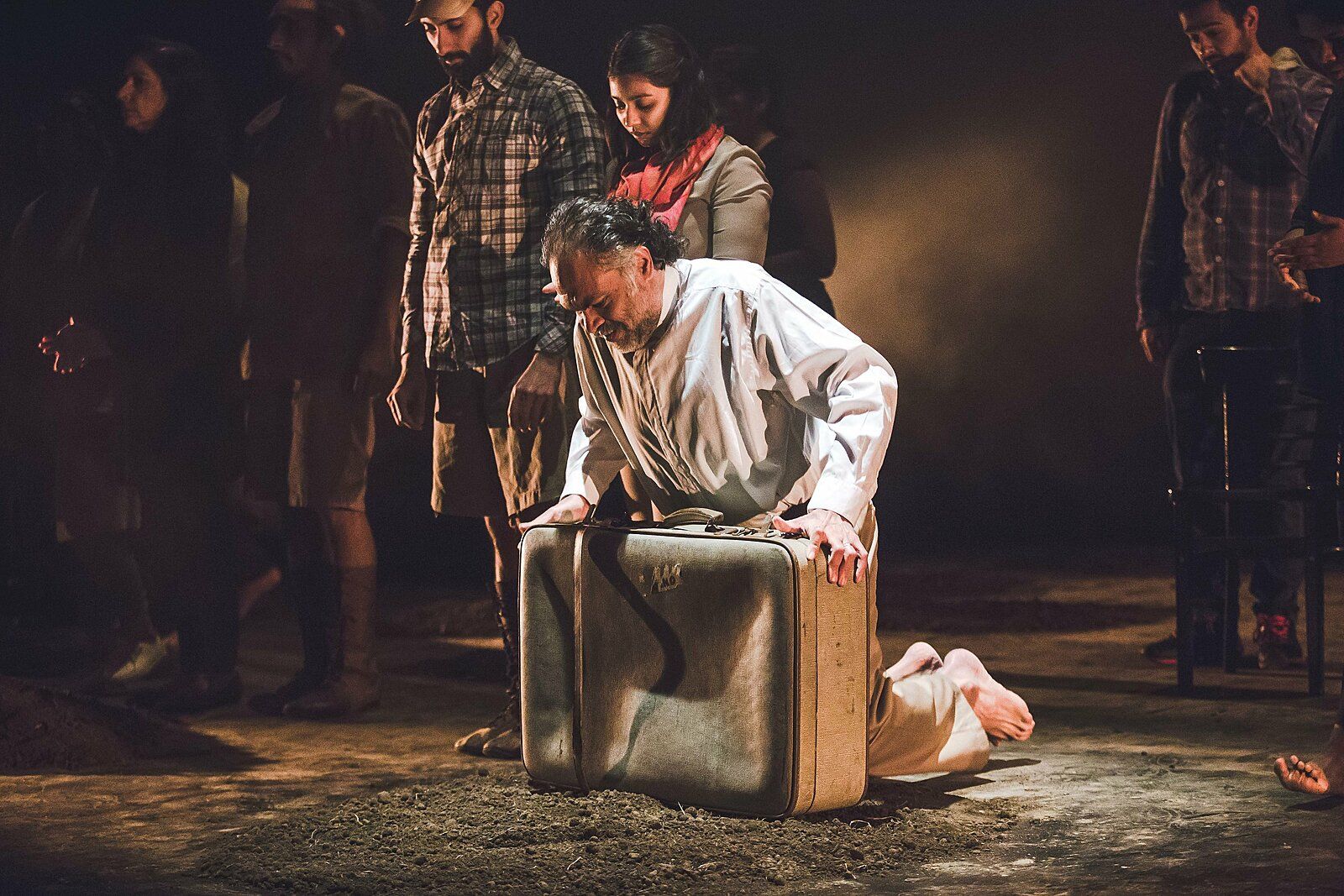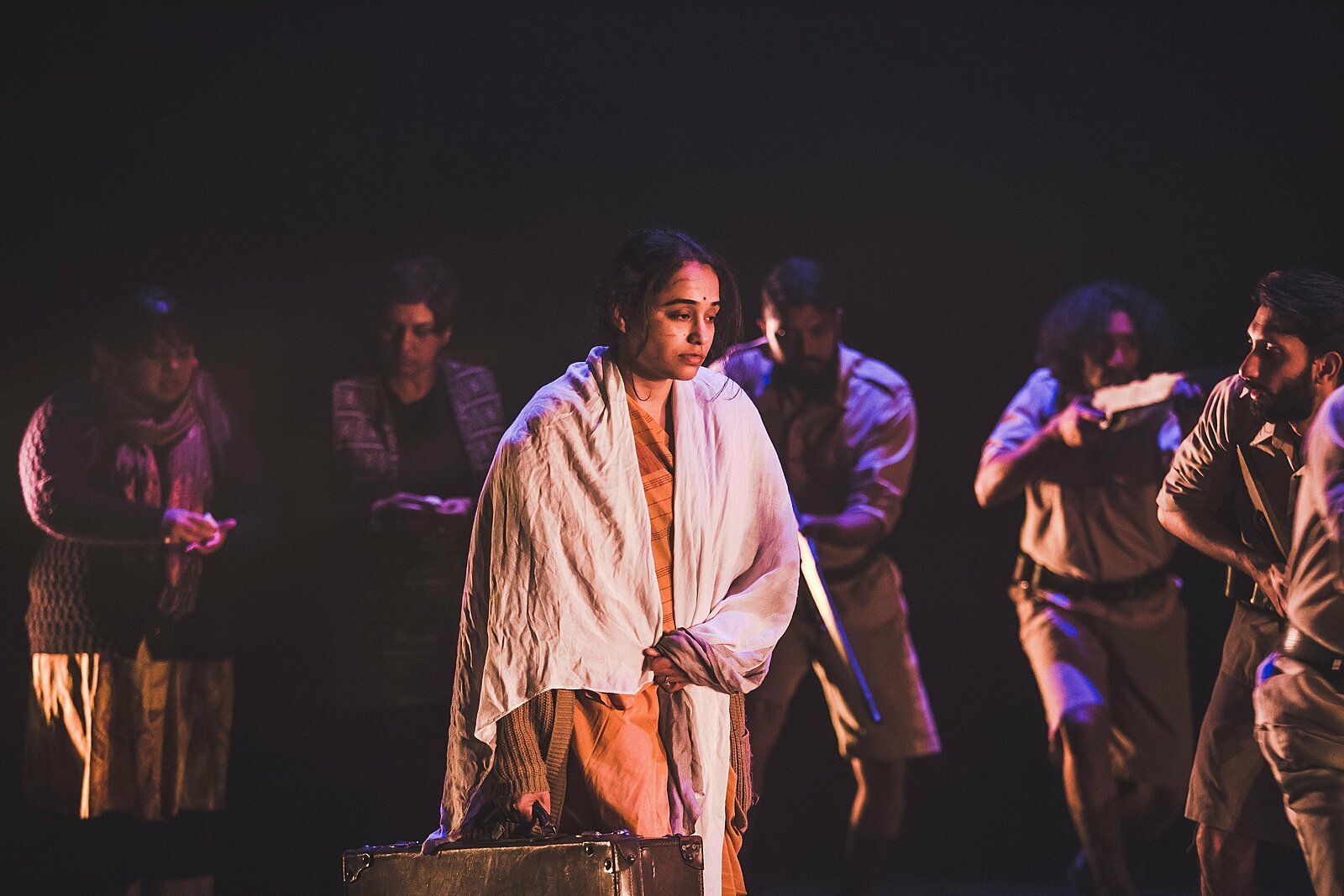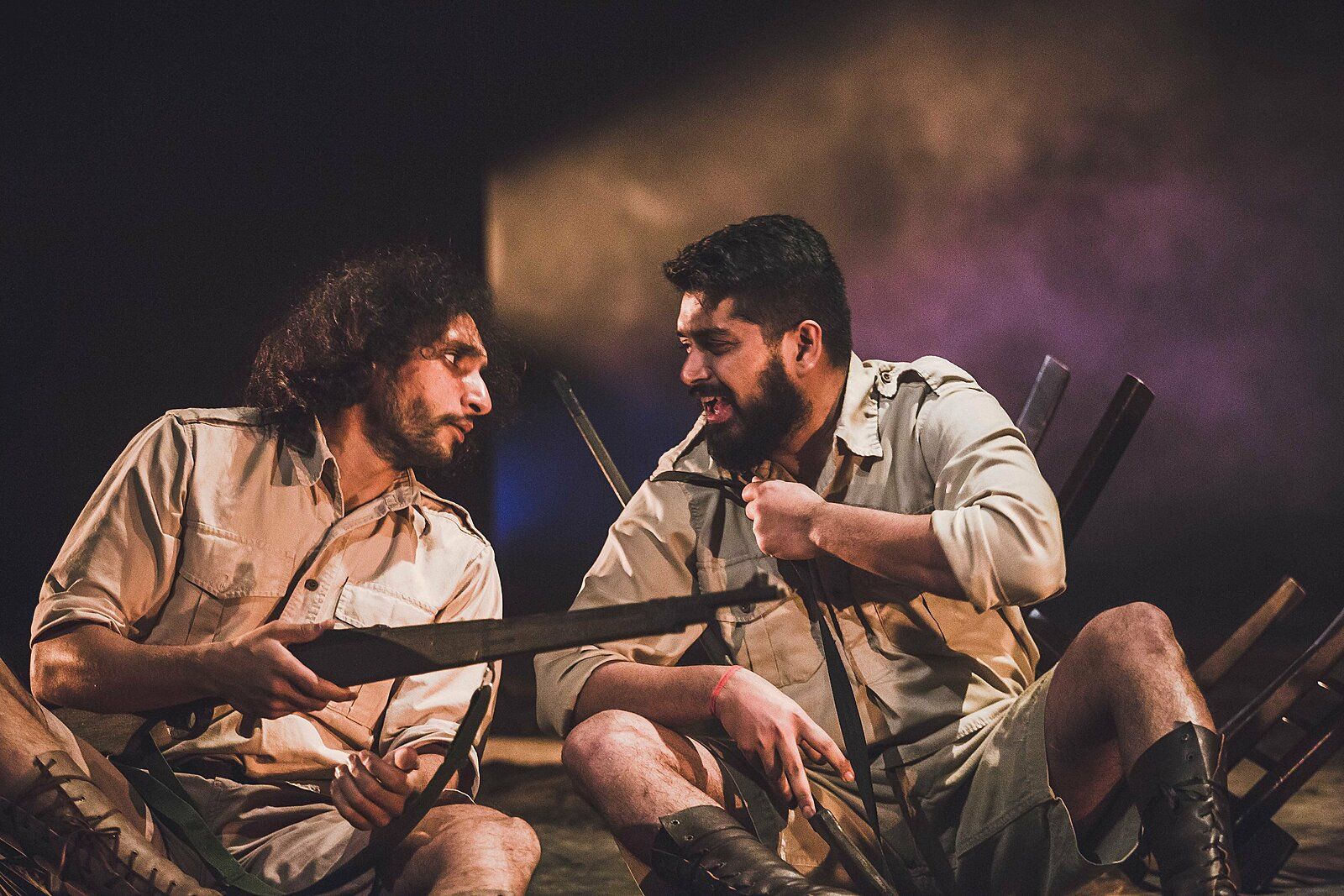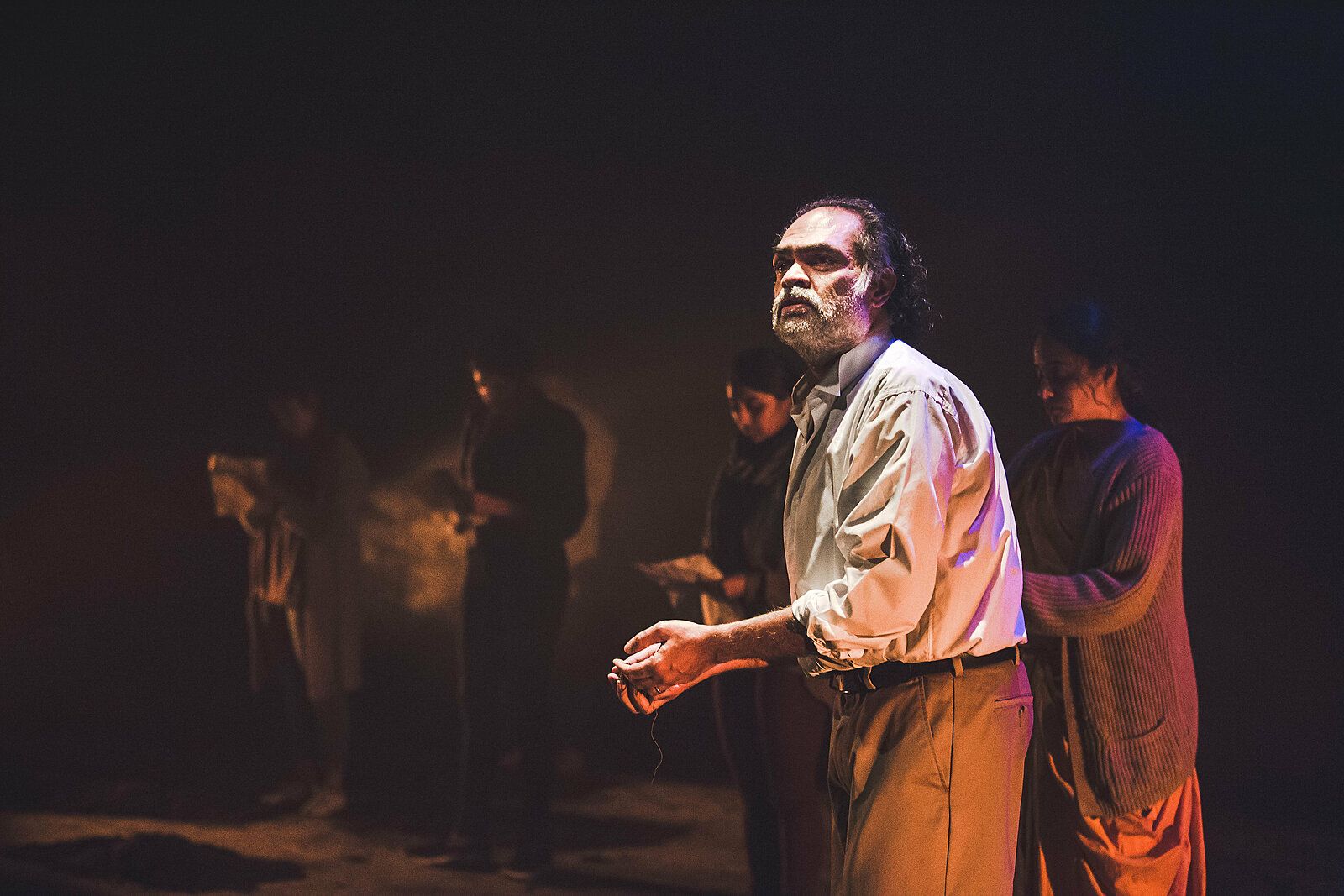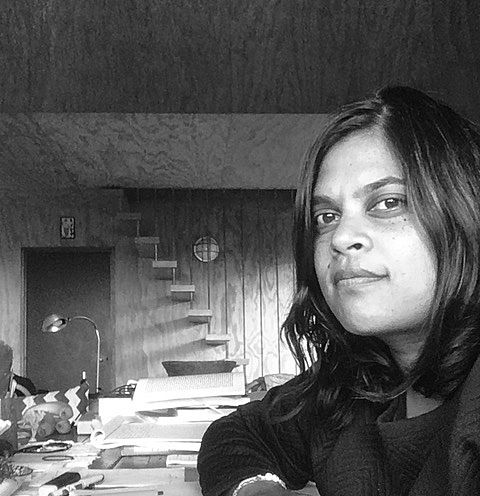Fertile Ground: A Review of 'Swabhoomi: Borrowed Earth'
Rina Patel reviews the latest from Prayas Theatre Company
Director Ahi Karunaharan has been collaborating with Indian theatre company Prayas for several years. Together they now present their most ambitious work to date. Swabhoomi: Borrowed Earth features a 20-strong ensemble and stories of Indian migration to New Zealand which span over 150 years. Rina Patel reviews the work.
Essentially a community theatre company, Prayas was established in 2005 by Amit Ohdedar. Until now, they have predominantly presented adaptations of classical Indian literature including Rohinton Mistry's A Fine Balance, Rabindranath Tagore's Kingdom Of Cards and more.
Naturally evolving, Prayas Theatre Company have now reached a point where the content of their work is really starting to break new ground. This is really exciting. Now they are exploring contemporary stories pertaining to the collective Aotearoa migrant experience, and more specifically, drawing from the cast’s personal experiences. The typical Prayas Theatre Company classical content always attracted its fair share of South Asian family, friends and work colleagues. But by staging a large ensemble contemporary story like Swabhoomi: Borrowed Earth, the company is fostering its potential to attract a more mainstream New Zealand audience. Clearly the voice of the younger generation is emerging.
The vision of director Ahi Karunaharan has led to a pivotal shift towards exploring the contemporary voice within Prayas.
The vision of director Ahi Karunaharan has led to a pivotal shift towards exploring the contemporary voice within Prayas. Even though Ahi is of Sri Lankan Tamil descent, his South Asian immigrant sensibility lends itself towards exploring New Zealand Indian history whilst developing the concept of ‘borrowed earth’ via the migrant lens.
In Swabhoomi: Borrowed Earth, Prayas bravely tackles the task of bringing the sometimes hidden and obscured history of Indians in Aotearoa to life. It’s a show of epic proportions; the narrative spans over 150 years, moving back and forth from the early 19th century right up to the recent student immigration fraud debacle.
Land. Earth. Dirt. Here, we find clumps of it carefully heaped in mounds on potato sacks placed on and around the stage. The soil is mostly referred to as different and borrowed, but fertile. The ‘borrowed’ of the title has both positive and negative connotations, suggesting land that is not ours but which over time can still help grow new roots. The abundance of earth in the set is in contrast to the poster image, in which four of the characters stand in a murky sea. While that tangible element of water is never present on the dirt stage, we are given a sense of it sonically, or through movement and dialogue.
In the early stages of the narrative we meet a 1920s Pukekohe market gardener; Kanjibhai (Mustaq Missouri, who plays the character somewhat melodramatically, a choice which is more modulated when we meet him in the present time). By 2017, in his ripe old age Kanjibhai has agreed to be interviewed by young journalist Samara (Divya Hariharan) and her filmmaker brother Rahul (Aman Bajaj). The pair revive Kanjibhai’s interest in activism for social change. Meanwhile, Samara’s best friend Riya (Lajja Prajapati) is busy preparing for her latest theatre show interviewing an ornithologist; Sarika (Nona Shedde).
One interesting highlight emerging from the company’s research were the forgotten Indian Sikh soldiers from Gallipoli. Theirs is a story worth expanding and I hope someone does. Clearly there is scope for this to grow into something more substantial.
Themes of love and marriage emerge post World War II through Parvati (Shriya Bhagwat-Chitale), newly-arrived in New Zealand, who is full of hope, excitement, and recently wed to an unknown Indian man who never actually turns up. The very notion of personal risk here cuts straight through and we can only wonder what this would've felt like.
The narrative shifts to the 90s where we meet widow Anita (Sudeepta Vyas) and her best friend Mira (Sangeeta Hariharan) who are venturing up Otago's Tuapeka Ranges. They share funny stories of how their identities are sometimes perceived so wrongly by resident non-Indians. We learn that this is the region where Black Pete (Roji Varghese), a Mumbaiker, struck gold in the late 1850's, but only recently received tangible acknowledgement in the form of a commemorative monument.
Representing the all-Indian women's group Mahila Samaj in 70s Petone, is the ever strident, outspoken leader; Geeta, beautifully played by Shweta Tomar, and her newbie, shy clamshell of a one-and-only member Ambika (Sneha Shetty). A fine chemistry between both actors spews forth some entertaining moments. We sense a women's group is empowering but at the same time can be hard, lonely and frustrating. We move back and forth from the 70s to 2017 where a fresh, young migrant, Nikitasha (Porvi Fomra) moves closer towards her permanent residency only to find the point system almost like a game which keeps changing, making it increasingly difficult and driving her to bitterness.
Amidst this tapestry of characters, sometimes the ghee-rich dialogue throughout Swabhoomi: Borrowed Earth feels a tad overwritten. There is a lot of it to absorb and perhaps with more rehearsal time it would have found a natural brevity. I did also wonder whether the work would lose anything by eliminating the echoes of plain folk theatre in its puppetry (with the classical male and female puppet, as well as feather-stick flocking, involving a small group of women each holding a bamboo stick with coloured feathers at one end, moving like a small flock of birds). These elements felt like a new thought or layer added into the mix to create a shift in tone and rhythm. For me they didn't quite work - perhaps more time was needed to develop the symbolism of each puppet at a deeper level.
The epic narrative also provides a substantial challenge; as we rapidly move over great swathes of time, following over twenty characters, some of the individual stories lose their narrative logic. At one point, I presumed Kanjibhai’s brother was a Gallipoli soldier only to find he wasn’t, he had his own story. In this way some of the scene transitioning blurred cross-generational connections.
That said, Swabhoomi: Borrowed Earth is a rare event. It’s incredible to see such a large ensemble of South Asian performers come together to connect for the love of story, history and representation (and all of whom offstage hold down regular day jobs). The historical context of Indians in New Zealand is deep and vast and it took one brave individual - Ahi Karunaharan - to cast-off the ship of collective navigation, bravely chartering Aotearoa’s Indian history both present and past.
As a second generation Kiwi-Indian woman myself, I look forward to the day the resident Kiwi-Indian voice emerges. Musically, it brings to mind Aaradhna Patel as opposed to Nitin Sawhney.
As a second generation Kiwi-Indian woman myself, I can immediately appreciate the effort Prayas Theatre Company have gone to in bringing the migrant perspective into the forefront in such a bold and endearing way. Yet I look forward to the day the resident Kiwi-Indian voice emerges – which I acknowledge is a very different vantage point. Musically, it brings to mind Aaradhna Patel as opposed to Nitin Sawhney - whose masterful music features throughout the show.
A production like Swabhoomi: Borrowed Earth also presents an interesting future question for the theatre company with community roots. If Prayas is intent on working on such ambitious projects which require strong skills in devising and storytelling, as well as broadening their audience, perhaps it would benefit the company to include some professional performers or mentors among their cast members from the community?
Regardless, it’s refreshing to see work where the migrant voice is loud and clear. At the core of the work is the question of tūrangawaewae: where do you feel at home? As the character Anita says “This is where we stand. This is where we plant our feet.” The show doesn’t neatly resolve anything, but history is remembered. And with it, the Indian migrant contribution to New Zealand's landscape and society is made tangible.
Swabhoomi: Borrowed Earth is a landmark production that ends on an open chord. There's no resolve or happy ending, but one certainly feels the power of a 20-strong South Asian collective onstage. Much like the process of making ghee, they simmer their truth along with history, to reveal clarified, authentic stories saturated in the migrant New Zealand Indian diasporic experience.
Swabhoomi: Borrowed Earth runs from Thursday 25 May – Sunday 4 June at TAPAC. Tickets available here.

